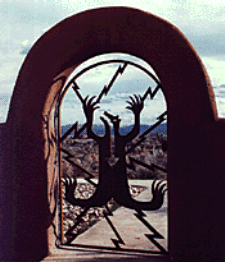
SECURITY AND THE INTERNET
It seems that every day there is another alarmist story about the
dangers of the Internet. Deadly computer viruses will be introduced
into the systems of our telephone companies and our government.
Criminals will rifle our bank accounts and filch our credit card numbers.
Unscrupulous bureaucrats are roving the Net, stockpiling intimate details
of our lives in vast databases, ready to deny us credit and medical
coverage. Big government has finally found a way to crack the
Constitutional protections against spying on our secret thoughts.
Slimy child pornographers are luring our children into
international rings of people willing to commit unspeakable acts.
The sheer size and breathtaking potential of the Internet has sent our
society reeling. There is no doubt that some of these horror stories
are based on fact. The usual reaction to something this sprawling,
uncontrolled and revolutionary is to dig in one's heels and try to
lasso and control it. This is particularly true of
those who have no experience with online communication.
- Our legislators are coming up with bills to regulate the Internet as
quickly as they can find "experts" to explain to them what they are
regulating.
- In early December 1995, providers agreed to limit
pornography on the Net in response to relentless Congressional
pressure, fueled by lascivious Press coverage.
- Companies like Netscape can offer public stock on the
basis of a security scheme that was broken by a couple of Berkeley
students in under a month.
- The government of New York City
would not even consider logging
on to the Internet until it had purchased a stand-alone RISC 6000
computer as a server, in spite of the fact that thousands of users,
some of whom may well hold a grudge, easily access the City network
on a daily basis.
While companies lay out millions of dollars for so-called airtight
security schemes based on cryptography, some of those most familiar
with the Net like Jack Rickard of
Boardwatch magazine argue that maximum security is best described
by using the "locked car" analogy. In other words, you take precautions,
but realize that the ultimate protection for your car comes, not from
locks, but from living in a society composed mostly of individuals
who agree that stealing is wrong and which provides powers to the
police to enforce an agreed-upon ethical code.

This group of Baruch College students in Professor Dianne Jordan's
graduate class on Networks and Telecommunications tries to separate
fact from fantasy when it comes to issues of security on the Internet.
 Hackers. Fritz
J. Nau enters the world of hackers and crackers on the Net.
Hackers. Fritz
J. Nau enters the world of hackers and crackers on the Net.
 Network Firewalls.
John Ye examines how software barriers to unauthorized access work,
and how successful they are.
Network Firewalls.
John Ye examines how software barriers to unauthorized access work,
and how successful they are.
 Ethics on the Internet.
Stephanie Yang questions the morality of Net users.
Ethics on the Internet.
Stephanie Yang questions the morality of Net users.
 Viruses. Gary Roth explains
what computer viruses are and how dangerous they really can be.
Viruses. Gary Roth explains
what computer viruses are and how dangerous they really can be.
 Encryption. Veronica
Acquavella describes
the concepts behind encryption and explains why this topic is of vital
interest to merchants and civil libertarians alike.
Encryption. Veronica
Acquavella describes
the concepts behind encryption and explains why this topic is of vital
interest to merchants and civil libertarians alike.
 Government and Censorship.
John Sheridan
examines the role of government and censorship in the free-wheeling
world of telecommunications.
Government and Censorship.
John Sheridan
examines the role of government and censorship in the free-wheeling
world of telecommunications.
 Top of page.
Top of page.
 Back to "Getting Started on the WWW"
Back to "Getting Started on the WWW"

Security Project Members:

 Please send comments about this page to Sue Young
at ysue@echonyc.com.
Please send comments about this page to Sue Young
at ysue@echonyc.com.

This project was developed in partial fulfillment of course
requirements for CIS 9350 (Networks and Telecommunications)
at Baruch College
School of Business.
 For additional information about our
graduate and undergraduate
CIS programs, please contact Prof. Mike Palley at
mailto:wpabb@cunyvm.cuny.edu.
For additional information about our
graduate and undergraduate
CIS programs, please contact Prof. Mike Palley at
mailto:wpabb@cunyvm.cuny.edu.

Last modified: 16 Dec 95




 Hackers. Fritz
J. Nau enters the world of hackers and crackers on the Net.
Hackers. Fritz
J. Nau enters the world of hackers and crackers on the Net.  Network Firewalls.
John Ye examines how software barriers to unauthorized access work,
and how successful they are.
Network Firewalls.
John Ye examines how software barriers to unauthorized access work,
and how successful they are. Ethics on the Internet.
Stephanie Yang questions the morality of Net users.
Ethics on the Internet.
Stephanie Yang questions the morality of Net users. Viruses. Gary Roth explains
what computer viruses are and how dangerous they really can be.
Viruses. Gary Roth explains
what computer viruses are and how dangerous they really can be. Government and Censorship.
John Sheridan
examines the role of government and censorship in the free-wheeling
world of telecommunications.
Government and Censorship.
John Sheridan
examines the role of government and censorship in the free-wheeling
world of telecommunications. Top of page.
Top of page. Back to "Getting Started on the WWW"
Back to "Getting Started on the WWW"

 Please send comments about this page to Sue Young
at ysue@echonyc.com.
Please send comments about this page to Sue Young
at ysue@echonyc.com.
 For additional information about our
graduate and undergraduate
CIS programs, please contact Prof. Mike Palley at
mailto:wpabb@cunyvm.cuny.edu.
For additional information about our
graduate and undergraduate
CIS programs, please contact Prof. Mike Palley at
mailto:wpabb@cunyvm.cuny.edu.
